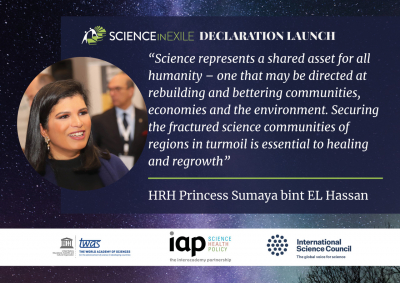


On 20 April 2022, The World Academy of Sciences (UNESCO-TWAS), the InterAcademy Partnership (IAP) and the International Science Council (ISC) will launch the Science in Exile Declaration titled 'Supporting at-risk, displaced and refugee scientists: A call to action'.
The Office of the United Nations High Commissioner for Refugees (UNHCR) estimates that, by mid-2021, more than 84 million people worldwide had been forcibly displaced, because of war, sociopolitical instability, persecution and climate change.
Countless scientists, doctors, engineers and others with advanced technical training are among those affected by unfolding emergencies and protracted crises alike. Those who survive such crises may be displaced internally, forced into exile in neighbouring countries, or end up scattered far from their homes, without jobs and without prospects.
These individuals represent invaluable assets for the global scientific community, and this loss of scientific knowledge, systems and data has grave implications for national and international science, as well as for society more widely.
At the same time, countries that once had well-established science communities and thriving research ecosystems have seen these weakened, even destroyed, while those countries in the earlier stages of developing their research often have faced the almost complete eradication of the science capacity that they were in the process of building.
“The 2021 UNESCO Science Report highlights that the international community must ensure that the skills and training of displaced and refugee scholars do not go to waste, and that scientists preserve and develop their expertise, both for their sake, and for the benefit of their home and host countries”, highlighted TWAS President Mohamed Hassan from the Sudan.
“TWAS has been working on this since 2017, and launched the Science in Exile initiative in March 2021. The initiative brings together at-risk, displaced and refugee scientists, along with like-minded organizations and international advocates for science and peace, to strengthen systems that support, protect and integrate affected scientists,” he added.
“Today, together with dozens of scientists and organizations worldwide, we reaffirm our shared vision of an international movement that promotes the protection of scientists, leading to better science and contributions to humanity”, added Sir Richard Catlow, Co-President of IAP and former Foreign Secretary of the Royal Society.
Her Royal Highness Princess Sumaya bint El Hassan, UNESCO Goodwill Ambassador and Special Envoy for Science for Peace and keynote speaker at the launch event, emphasised that “Science represents a shared asset for all humanity — one that may be directed at rebuilding and bettering communities, economies and the environment. Securing the fractured science communities of regions in turmoil is essential to healing and regrowth.”
“I am wondering how many science organizations, universities, donors and governments are aware of the value of this human capital. I mean at-risk, displaced and refugee scientists, and the value they create and add to their host countries and to development in general, in addition to their role in rebuilding and the peacebuilding in their home countries. How many of these bodies are aware they should be fully supporting programmes to assist these scientists? We must all understand that supporting these scientists is not just a humanitarian duty, it is a fundamental assignment to serve and save the national, international and regional scientific environment development,’’ said Saja Al Zoubi, a Syrian social scientist who serves on the Science in Exile Steering Committee, currently working at Saint Mary’s University, Canada.
"The ongoing conflict in Ukraine is a stark reminder of the human tragedy of war and displacement, and that interrupted research careers and studies can have long-lasting global consequences for vital scientific research. Together, we must take action to help at-risk, displaced and refugee scientists to thrive", said Sir Peter Gluckman, President of the ISC.
The Declaration, which benefitted from contributions from scientists and key partners in the growing Science in Exile network, outlines six key commitments necessary for both immediate and long-term support, and protection to scholars and scientists who are at-risk, displaced or refugees, so they can continue to make their rightful contributions to science.
The commitments are:
With 15 organizations that have already pre-endorsed it, the Declaration will be officially launched on 20 April and opened to signatures from universities, science academies, non-governmental organizations, governments, international organizations, diaspora groups and others.
UNESCO-TWAS, IAP and ISC urge organizations from the scientific and humanitarian communities to join in their efforts.
For more information about the Science in Exile initiative, the Declaration and how to sign it, please visit: https://scienceinexile.org/
To learn about and register in the Science in Exile Declaration launch event, please visit: https://scienceinexile.org/event/call-action-support-risk-displaced-and-refugee-scientists-launch-science-exile-declaration
The World Academy of Sciences for the advancement of science in developing countries, founded in 1983, is a programme unit of UNESCO. Its principal aim is to promote scientific capacity and excellence for sustainable development in developing countries. Today, UNESCO-TWAS has 1,296 elected fellows—some of the world’s most accomplished scientists and engineers—representing more than 100 countries; 11 of them are Nobel laureates.
Under the umbrella of the InterAcademy Partnership (IAP), more than 140 national, regional and global member academies work together to support the vital role of science in seeking evidence-based solutions to the world’s most challenging problems. In particular, IAP harnesses the expertise of the world’s scientific, medical and engineering leaders to advance sound policies, improve public health, promote excellence in science education and achieve other critical development goals.
The International Science Council (ISC) is a non-governmental organization with a unique global membership that brings together 40 international scientific Unions and Associations and over 140 national and regional scientific organizations including Academies and Research Councils.
